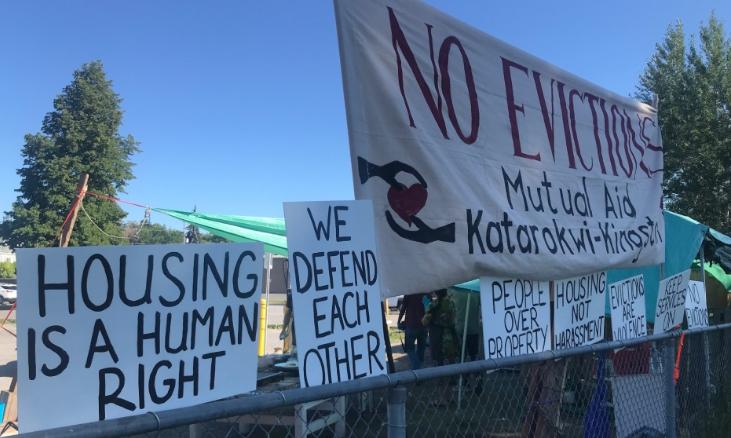From Mutual Aid Katarowki-Kingston (Facebook)
Wednesday night’s City Council meeting was disheartening.
Council voted to not establish a sanctioned encampment at any location, including the Integrated Care Hub (ICH). They voted to re-enact the Encampment Protocol as of June 30, and to impose a cruel 6-hour eviction warning period instead of the previous, and already inhumane, 48 hours.
Rather than centering the needs of people who are unhoused, City Council considered the increased liability risks involved in sanctioning an encampment. Such liability would have been decreased if more services had been included in the City’s proposed models. Unhoused people had asked for many of these services in their consultations with the City, and these same services had been identified as necessary for success in the City’s “Jurisdictional” report (a brief scan of sanctioned encampments in North America). However, the identified services weren’t included because City staff felt the services might have been perceived by Council as too expensive. Consequently, the “low-cost” models didn’t meet encampment residents’ basic needs and failed to meet a liability threshold with which the City was comfortable. In other words, the proposed models were doomed to fail – they weren’t designed to be successful by any standards.
Another reason cited for rejecting the sanctioned encampments was that they were perceived as a temporary, stop-gap measure. So the $358,000 that was earmarked for sanctioned encampments was allocated to other housing solutions to be determined by City staff. Council voted to fund 5 additional sleeping cabins and 8 additional spaces in low-barrier overflow shelters, as well as support for non-profits to procure spaces to house groups of people in community with wrap-around services. These are much-needed options that will hopefully offer more choice to people who are unhoused, but they are insufficient, they will take time, and they will not support everyone. Where is the immediate support? Where will unhoused people live now? What are the low barrier solutions that will prevent people from being pushed further into the woods this summer?
As an alternative to the sanctioned models, Council could have supported the self-determination of people who are unhoused and living in encampments by simply allowing them to stay where they are. Instead, they used patronizing language to argue that all encampments are dangerous for those who live there. Despite the risks, people still choose it over other options, which tells us how poor those other options are.
The truth of the matter is that, because of the decisions the City of Kingston has made at this meeting, unhoused people are at risk of death. We are seriously concerned that the City of Kingston’s actions have and will continue to negatively impact unhoused people and that this could mean that some people end up overdosing on drugs and dying alone in the woods.
Also troubling was that, despite the sanctioned encampment pilot being the impetus for Wednesday’s meeting, the staff report and many delegations proposed banning shopping carts in the downtown area and an anti-loitering bylaw. These proposals were not part of the public consultations that led up to the meeting, yet they were included in the report. Organizations representing some of the downtown business community (not all, because we know some businesses oppose these measures) were out full force, alleging increased safety concerns. We have empathy, especially for low-wage workers who are on the frontline of businesses. But we can’t police our way out of a housing and drug poisoning crisis. Sweeping the streets of people who are unhoused is not going to solve any problem; all this does is hide the problem from those who are entitled and feel uncomfortable. We cannot allow our city to choose middle-class comfort and order over justice.
As several delegates pointed out, when we talk about public safety, whose safety is being prioritized? Who is considered when we refer to ‘the public’? What constitutes violence or harm? The focus on ‘threatening behaviour’ obscures the immense violence of capitalism and the economic inequality it produces, as well as the violence of the combined inaction to address inequality and the punitive surveillance and policing of people who are poor and unhoused.
It was pointed out that these proposals could target people who are unhoused and could be, therefore, discriminatory, so Council changed some language and delayed both proposals. Staff were directed to provide options to address “obstructions” (aka shopping carts) and consult with the public on the possible development of a “public nuisance” (aka anti-loitering) bylaw. We don’t imagine that the language shifts from “shopping carts” to “obstructions” and from “anti-loitering” to “anti-nuisance” will be any less classist in their imagination and application – the DBIA and others made it pretty clear who they are targeting to be removed from the downtown.
We will continue to monitor these situations and provide resistance and community-based, mutual aid alternatives moving forward.
What can we do next?
1. Attend MAKK’s Bystander Solidarity training on how to intervene if you see a person who is unhoused being harassed. Thurs July 7 at 6pm. (Click here for Facebook Event)
2. Fill out this MAKK form to tell us which encampments you live near, and your contact info. We are seeking to connect people who live near the same parks so you can coordinate support and stay in touch in case of evictions:
(Click here for Cryptpad Form)
(Click here for Cryptpad Form)
3. If you would like to better support your neighbours living in parks but don’t know where to start, contact MAKK and one of our members would be happy to talk about how to make an initial connection and follow up!

